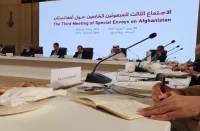One of the most important events related to the war in Afghanistan to occur over the past few weeks was the publication of a report by a group of British experts concerning an inclination towards compromise among the Taliban. The authors interviewed several informed sources to prepare a report about how and under what terms the Afghan armed opposition would be prepared to engage in dialogue with the government.
At the moment, there is no reason to believe that the report is bogus. The authors “assertions” are modest: They do not claim to have talked with Mullah Omar or some leader from the “front-line shuras,” including Haqqani or Mullah Zakir. According to information in the document, they had four sources, of which two were in the Taliban government prior to 2001, and two are currently in active contact with Taliban field commanders for various reasons.
In addition, we can say that the sources reported true facts: Mullah Zakir and the “military shura” (a Taliban ministry) that he heads are opposed to compromise and negotiation, and Haqqani’s position is highly dependent on decisions by Pakistani intelligence, with which it has close ties.
I should mention that the sources did not name a single high-ranking official in the Taliban leadership or any structures or groups that might be vehicles for peace. That is only natural, considering that a big purge was carried out among the Taliban this past spring involving the Pakistani Inter-Services Intelligence Directorate and Zakir’s people. About two dozen of the movement’s functionaries who favored compromise were killed or arrested.
Still, it is unlikely that the desire for peace disappeared with them. Bear in mind that the commanders operating in Afghanistan, including the shadow governors of districts and provinces, are subject to constant strong pressure from Afghan and US forces. Each month hundreds of militants are arrested or killed in clashes with the authorities, and commanders are constantly hunted by Afghan special operations forces and must move constantly to avoid being killed or arrested. A number of commanders who have entered the Reconciliation Program demand as their first condition an opportunity to sleep peacefully.
To that is added the natural fatigue of a war with no apparent future. In 2010 and 2011, NATO and the Afghan authorities succeeded in inflicting a number of significant losses on the Taliban, including in Helmand and Kandahar, the movement’s traditional stronghold. A number of prominent commanders close to Zakir and Haqqani were killed.
The statistics of the losses themselves, which are much lower for the police and military than four the militants, could make them feel as though they are butting their heads against a concrete wall.
In any event, the British report talks about the next “peace program,” which is finding traction among the Taliban. Those that accept agree to:
– Conclude a cease-fire;
– Stop cooperating with al-Qaeda and even collaborate with the United States in the fight against the jihadists;
– Preserve democracy in the country, possibly with a greater focus on a parliamentary republic;
– Retain a number of achievements along modern lines, including universal and even mixed schooling that includes secular subjects.
The demands of those with whom the researchers’ sources associated were as follows: the resignation of Hamid Karzai and his team, who are considered corrupt and ineffective, and changes to his constitution.
However, it is not entirely clear whether this is the unofficial position of the “moderate Taliban”, or whether the British report is simply conveying an attempt by the Taliban leaders to feel out their opponent’s position for the next round of talks in Qatar. The Taliban’s press service has formally denied the authenticity of these statements, but the original publication of the report in the media is sufficient to track the response of the expert and political communities.
For now, it is difficult to predict the reaction. Objectively, NATO and official Kabul can negotiate from a position of strength because they are currently succeeding militarily. But the United States and its allies are suffering from public skepticism about the war in Afghanistan. Despite real progress in the region in recent years, the public is too tired of the war to judge its progress objectively and is demanding immediate results. Against the backdrop of the upcoming US presidential elections, such sentiments could force the White House to make concessions, including a ceasefire in Afghanistan, which would be of military benefit only to the Taliban.
However, it is unlikely that any of the realistic Western politicians will go so far as to give up Karzai. Afghanistan’s current government has more resources than the Taliban does. And the simple mechanical replacement of the incumbent president with someone from a different political clan would inevitably lead to the redistribution of power and destabilize the situation. Once again, only the armed opposition would benefit.
The most desirable reconciliation format for the United States and Kabul is still the defection of individual units and field commanders from the Taliban, which actually is what the national Reconciliation Program is intended to accomplish. Unfortunately, its effectiveness is limited: The number of militants who have surrendered has only begun growing in the last six months, and there are still cases of reverse defection by Taliban who had laid down their arms and entered government service.
If one of the movement’s iconic figures were to join the Reconciliation Program, it would have the impact needed, but so far that has not happened. Moreover, there is information saying that negotiations with some of the Taliban leaders have been used as cover for suicide bombers to infiltrate Kabul. It was just that kind of move that resulted in the assassination of Peace Council head Dr. Rabbani.
However, the authorities also cannot abandon the practice of “reconciliation” because the mechanism may play an important long-term role in destroying the armed opposition. But for that to happen, the Afghan authorities need to improve the political and propaganda techniques that underlie the practice, and they should draw on international experience in meeting such challenges.
Nikita Mendkovich is historian, economist and expert at the Russian Center for Modern Afghanistan Studies.
Source: New Eastern Outlook














The report published by a group of British experts coincides what NHK, Japan public TV broadcster reported based on interviewing Taliban negotiators in Qatar.
The text is available now.
http://www3.nhk.or.jp/nhkworld/english/tv/todayscloseup/index20120911.html
Thanks for the link, Iida. Indeed, there are many correlations. It is not strange as same people might be interviewed earlier by the British (the report was issued in July) and later by the Japanese.